Ghost to Ghost
What? Another Hallowe'en issue of The New-York Ghost? Yes! Visit the site to learn how to get a free subscription—but brace yourself: There's a totally jaw-dropping image that will have you climbing the walls. Not safe for work!
What? Another Hallowe'en issue of The New-York Ghost? Yes! Visit the site to learn how to get a free subscription—but brace yourself: There's a totally jaw-dropping image that will have you climbing the walls. Not safe for work!

"You are leaving New York in 3 hours," he said quietly. "And you will in all likelihood do nothing particular in Chicago itself. Except to report to a certain man there who is high in our System—one Nasaku Sato. What you will do, Shinzo, will be done between those cities, the spirit of Jummu Tenno permitting. And what you will do will advance, more than anything known today, Japan's plans for the domination of all China. And the consequent attainment by her of a huge nucleus for man-power—as well as an adequate territorial base—for the formation in 30 or 40 years of a vast military, naval, and aeronautical machine capable by that time of upsetting the whole white tenure of land on the Western half of this rich country here. In short, Shinzo, to you has been given this day of October 30th the honor of recovering the 13th Coin of Confucius!"
—Harry Stephen Keeler, Finger, Finger! (1938)
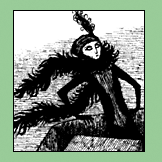
The story quotes Dr. Krzysztof Izdebski, a San Francisco–based voice and speech pathophysiologist—total nomen/omening! (Our favorite Polish name is that of the protagonist of Harry Stephen Keeler's The Book With the Orange Leaves—one-handed "rapid calculator" Stefan Czeszciczki, a/k/a "Zicky.")
One of the most peculiar aspects of SD is that victims are typically unable to have intimate conversations in their normal voice. Yet they can speak under different circumstances, such as immediately after sneezing or laughing, or in an exaggerated falsetto or baritone, or while reciting poetry, according to SD support groups.Patients are often so anxious about their speech that they stop breathing or have heart palpitations before trying to articulate their thoughts. There is no known cure — but many victims have improved their speech by changing tenor or pitch, or doing special breathing and relaxation exercises.
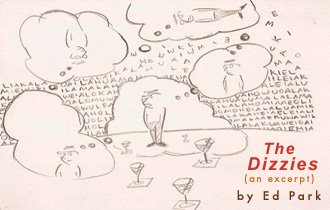
Paul Collins was on NPR today, talking about James Curtis, the first true-crime writer, and . . . anthropodermic books! Read more in his amazing piece, "The Molecatcher's Daughter," out in the new (November) Believer (which is chock full of other great stuff—trust me!).
Today at 6 and 8:30, Anthology screens Bill Daniel's short, elliptical doc Who Is Bozo Texino? (I wrote an appreciation of the film that will appear in the Believer's visual issue in December.) It's about hoboes and their distinctive boxcar graffiti—a nice real-life counterpart to the 700 hobo names in John Hodgman's The Areas of My Expertise.

Lots of responses to the first "Eyes Have It" post—
When I read Angier's review of The Family That Couldn't Sleep, I was reminded of the insomnia epidemic that struck Macondo in One Hundred Years of Solitude. An after-effect of that insomnia was amnesia. To avoid forgetting the names of household objects and farm animals, Macondians had to hang signs around everything. My favorite example, which I'm paraphrasing from memory since I don't have an English-language edition handy, was a sign that said: "This is a cow [Io?]. It has to be milked every morning, to obtain milk, which is used to make coffee with milk."


Name of Korean pop duo, seen in credits at end of movie in last night's dream:
 1. This creepy illustration (by Lou Beach) appeared in the October 8 NYTBR, accompanying Natalie Angier's review of D.T. Max's The Family That Couldn't Sleep. The book "tells the story of a an Italian family that for at least 200 years has been plagued by an extremely rare hereditary disease that destroys the brain's capacity to fall asleep."
1. This creepy illustration (by Lou Beach) appeared in the October 8 NYTBR, accompanying Natalie Angier's review of D.T. Max's The Family That Couldn't Sleep. The book "tells the story of a an Italian family that for at least 200 years has been plagued by an extremely rare hereditary disease that destroys the brain's capacity to fall asleep."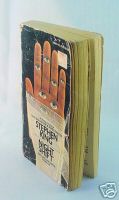



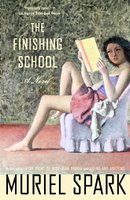





In some of Buffalo’s East and West Side neighborhoods, children who wake up in the morning eager to get outside and enjoy the summer sun are greeted instead by rat-infested, condemned houses. PUSH Buffalo (People United for Sustainable Housing) estimates that the State of New York is responsible for 1,499 neglected and abandoned properties in the city. On July 12, PUSH opened a new front in their campaign to shame Governor George Pataki into forcing the state agency that owns these derelict properties to take responsibility for them.
The plan is to nail eight-by-five-foot pieces of plywood to the doors of as many condemned buildings as possible. The large pieces of plywood are complete with a stencil drawing of Pataki, a sentence about the problem and a phone number to his office for complaints (518-474-8390). The goal is to keep the neighborhood secure from the threats these buildings pose and draw attention to the fact that MBBA, the agency that holds the mortgages on these properties, has not taken responsibility for the problem.
I took another picture of the store front of Vy Vy's Gifts. I've seen it for the last three years because it's on my way to school. There's a poster of Bruce Lee in the window. This place, along with so many others on Bailey Ave., are just empty and have been that way for years. It's kinda sad. I wanted to drive down Dartmouth Ave. today to take a picture of [of birthplace of Dizzyhead Ed] but they were cutting trees and stuff so I didn't.

[H]er instructions about “How to Write Your Own Gilbert and Sullivan Opera” seemed to deflate the reputation for wit and effervescent fantasy the operettas had acquired. She provided “all the necessary ingredients” for do-it-yourselfers, offering a model prime example. She stirred together patter song and madrigal, paternal stubbornness and young love, class snobbery and babes switched at birth and led her star-crossed heroine, Pneumonia Vanderfeller, to happiness and ever-greater wealth.
REPRESENTING ISLAM: A Talk by Tariq Ali and Eliot WeinbergerFriday, October 20th, 7pmMcNally Robinson Booksellers52 Prince Street(212) 274 1160An illuminating and provocative conversation on the representation of Islam in the West at a time of demonization of the Muslim world by international leaders and much of the media.
Weinberger is terrific—especially "What I Heard About Iraq," a brilliant use of quotation. (I think we can call it a "cento.") I haven't read Ali, but I'm intrigued...
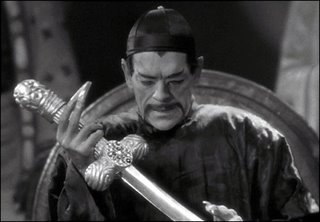 Tantalizing fact in Dave Kehr's recent Times DVD column on rereleased horror films:
Tantalizing fact in Dave Kehr's recent Times DVD column on rereleased horror films:"Mask" followed a series of now unavailable Fu Manchu films produced by Paramount, with Warner Oland (at the same time he was playing the infinitely more benign Asian stereotype Charlie Chan over at Fox) as the salivating embodiment of the Yellow Peril from Sax Rohmer’s popular novels.The two iconic Celestials, played by the same actor!
Yellowface fans, here's another cinematic treasure for you... 1932's The Mask of Fu Manchu is now available on DVD, part of Warner Brothers' "Hollywood Legends of Horror Collection." It really doesn't get much worse than this. Warner Oland in the titular role, with full yellowface makeup, playing the embodiment of the terrifying yellow peril: New DVD's: Horror From Hollywood. I'll admit, I'm sort of curious—I've actually never seen the film, or the many other entries in the series. But one look at that photo is all you really need to determine... That's racist!
1. Dizzyhead Ben Kenigsberg, now a film critic at Time Out Chicago, recently slugged it out with Hannity & Colmes over the film Death of a President. BK makes a smart point: Most of these chains banning the film would never have shown such a low-budget release anyway.
 Feeling down?
Feeling down?

I was convinced on several occasions that this book was a spoof. Apart from his epigraph to one section...there is the entire first chapter, the thesis of which is: 'The Beatles's music from the early period is the very sound of the toilet.' It is positively exhausting what he can do with this lavatory metaphor...Hamburg was 'a bigger, hotter, riskier toilet than they'd found back home'. Fifty pages, making sure we've got the full point.I was reminded of Dizzyhead Devin's audacious opening chapter by yesterday's Times piece on the closing of CBGB. The print version ran a photo of the club's famous loo, empty but still horrifying, the walls disorientingly scumbled with graffiti and stickerage. On the little video embedded in the Times article, someone speaks with amused horror of the whole CB's bathroom trauma: "Maybe a certain...Karen Finley experience of dousing yourself with fluids may have started there."
By asking me to watch those wild Asian movies, I think Marty was pushing me to try something different. I tried to do that, but after a couple of days on the shoot I realized that although the styles of those movies were great for the particular stories they were telling, we were doing an American movie with American stars. In the end, I had to pull back a bit from those wilder styles; I couldn’t go that far with this movie.Coming soon: My thoughts on Park's Sympathy for Lady Vengeance.

I write to pay back my debt. I write out of guilt, to fill the blank pages the world sets in front of me. When I say pay my debt, perhaps I should say pay my way. Giving back something, that is, transforming the energy that floods into us all from overwhelming presences of people and places, mountains and operas and sailboats and a hawk over my head.
Interviewer: Besides using a reduced language, you also leave a lot to the imagination in terms of narration. Sometimes we cannot even know where we are, when it is taking place and who is talking.
I used to write like that even in the stage plays. I do not name where it is happening and who to. I did not want to name anything.
 1. Many thanks to Matt Singer for tending the Dizzies bar while I was out doing...what was I doing? Disney—astonishingly cheesy superhero floats—the latest Clint Eastwood news...all topics beyond my ken!
1. Many thanks to Matt Singer for tending the Dizzies bar while I was out doing...what was I doing? Disney—astonishingly cheesy superhero floats—the latest Clint Eastwood news...all topics beyond my ken!So many of the writers in Up Is Up are past contributors to The Village Voice—as is the book's editor, music writer Brandon Stosuy—the tome could almost serve as tombstone for this paper's literary heyday.
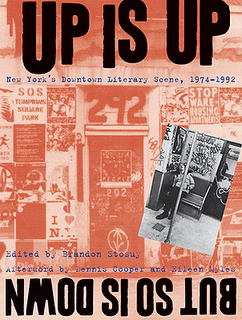
 Buffalo and surrounding areas have been hit with a couple feet (at least) of heavy, wet snow since yesterday afternoon. The slush storm caused countless downed trees (made even heavier by the presence of autumn leaves), which in turn brought down countless power lines. Even for those who choose to ignore the travel ban in most towns, fallen trees block many narrower roads. The NYS Thruway is even closed! Amazingly, I still have power in my little apartment, though not heat. Buffalo is considered the "city of good neighbors," which is indeed an apt description. When I found my car stuck in the parking lot at 7AM, I was greeted by a neighbor with a shovel, who heard my car's sad grunts. With his and his son's help, I managed to get out of the driveway, back into my parking spot.
Buffalo and surrounding areas have been hit with a couple feet (at least) of heavy, wet snow since yesterday afternoon. The slush storm caused countless downed trees (made even heavier by the presence of autumn leaves), which in turn brought down countless power lines. Even for those who choose to ignore the travel ban in most towns, fallen trees block many narrower roads. The NYS Thruway is even closed! Amazingly, I still have power in my little apartment, though not heat. Buffalo is considered the "city of good neighbors," which is indeed an apt description. When I found my car stuck in the parking lot at 7AM, I was greeted by a neighbor with a shovel, who heard my car's sad grunts. With his and his son's help, I managed to get out of the driveway, back into my parking spot....and disrespectfully say that this is right stupid. From David Poland's review of Flags of our Fathers, Clint Eastwood's first of two films about the Battle of Iwo Jima:
Even though the flag raising on Iwo Jima seems like perfect Eastwood material, it is not. Not because he can't handle a war film or that it is too complex. His strength is working from simplicity and then turning it upside down and inside out. The problem is that there is no villain in the story. There is no standard from which hypocrisy can rise and, ultimately, fail under the weight of good, flawed men. The story of Iwo Jima and the flag raising - at least as Eastwood and Haggis tell it - is not that interesting and, more importantly, the life and death of soldiers was as random as the flip of a coin. In the specific of the flag raisers, three survived the island and three did not. And for all the "he was the best soldier ever" crying, it could have easily been the three who died that survived and vice versa.
Dizzies dean Ed Park has his Ten Words Project for reviewing everything in the entire world in just ten words. But for a writer of minimal talents and infinite sloth like myself, ten words is way too much. What can you say in ten words that can't be said in one? Well, okay, you can say nine other words. But, c'mon, one is enough. And in today's world there's so much competing stimulus, who has time for nine words?
Found on YouTube, as pointed out by Comic Book Resources's Pipeline and Kung Fu Rodeo. This crap just blew my mind and also made me retroactively hate the thousands of comic books I've read in my life, as well as Back to the Future.
Yesterday I asked which of these four lines was not a legitimate personality trait from a contestant on MTV's NEXT. The choices:
[Just jumping in for a second to tell you that the third issue of The New-York Ghost, the weekly newsletter you print out at work, will be sent via electronic mail later today. Visit the site to learn how to get on the list. Now stay tuned for more Singerized Dizzies. —Ed]
At this point only two groups of people watch MTV: 13 year old girls and 25 year old boys fascinated and perversely amused by what 13 year old girls watch. MTV's programming has become so deadpan in the last couple years, that at this point it's unclear which demographic is the target and which is the happy accident. Even the producers/writers/directors making these programs seem unclear: are they recording their subjects or mocking them? Sometimes I wonder if we asked that question to two different members of the crew of one of these mad television programs if we'd get two different answers.
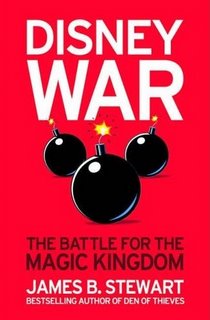
Do not attempt to adjust the picture. We are controlling transmission. If we wish to make it snarkier, we will bring up the volume. If we wish to make it stupider, we will do so. We can reduce the focus to a soft blur, or sharpen it to crystal clarity. We will control the horizontal. We will control the vertical. For the next week, sit quietly and we will control all that you see and hear. You are about to experience the awe and mystery which reaches from the inner mind to... THE DIZZIES!


1. Anyone with even a glimmer of interest in the New York Downtown writing scene should take a look at Brandon Stosuy's amazing (and beautifully produced) new book, Up Is Up, But So Is Down (the title of which I once mangled), out now from NYU. What a treasure trove! This is one of those books (I predict) that you won't read straight through, but rather dip into periodically for jolts of arcane energy and inspiring madness.

 1. This appeared on the back of an ad supplement ("Spain Gourmetour"—eh?) in the Times. A truly Borgesian bottle label would feature an illustration of . . . the bottle, on which could be discerned a much smaller but otherwise faithful illustrated label, and so on. (The reflection of the veggies is a nice, vaguely Borgesian touch, I suppose.)
1. This appeared on the back of an ad supplement ("Spain Gourmetour"—eh?) in the Times. A truly Borgesian bottle label would feature an illustration of . . . the bottle, on which could be discerned a much smaller but otherwise faithful illustrated label, and so on. (The reflection of the veggies is a nice, vaguely Borgesian touch, I suppose.)
4. At The Royal Scam, Dizzyhead Drew is blogging up a storm! (Is it true you pronounce the name of this blog with an emphasis on the second syllable?)“What we need,” one of those scary critics who write for the serious magazines said recently, “is more straight talking about bad books.” Well, of course we do. It’s hard to think of anything we need more, in fact. Because then, surely, people would stop reading bad books, and writers would stop writing them, and the only books that anyone read or wrote would be the ones that the scary critics in the serious magazines liked, and the world would be a happier place, unless you happen to enjoy reading the books that the scary critics don’t like—in which case the world would be an unhappier place for you. Tough.
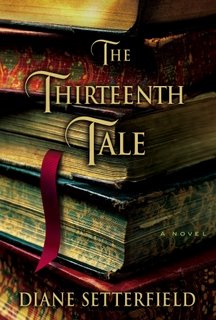
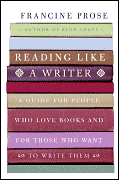
The Chinese can be relied upon for two things: food and spit. Regarding the latter, Animal magazine is looking for your spitting-Asian pictures, presumably for some sort of expose of the saliva-flecked streets of lower Manhattan.Or is this somehow "OK" to say? (Someone call up Angry Asian Man!)
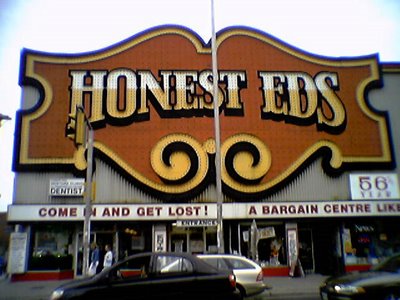
1. We begin today with a salute to Michael Atkinson. Though best known as a film critic, M.A. is a pleasure to read on the "life literary" as well. If you haven't read it already, dig into this great piece about other people's bookmarks.
"With a little effort, anything can be shown to connect with anything else: existence is infinitely cross-referenced. —Martha Cooley, The Archivist (1998)
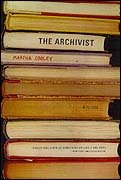


1. A random connection in something I was reading led me to open Anthony Powell's Temporary Kings at random. Isn't this great?
At the time of his death, Trapnel's oeuvre, so far as I knew, consisted of The Camel; the selection of short stories published as Bin Ends; a fair amount of additional stories, never yet collected, some dating back to his early days as a writer before the war (when he had kept himself alive by all sorts of odd employments); a miscellany of occasional pieces, criticism (some of it quite good), articles, parodies, stuff written for papers like Fission, and never brought together; finally the conte (unpublished in Trapnel's lifetime on accound of some legal battle over 'rights') Dogs Have No Uncles. A work in Trapnel's liveliest manner, almost long enough to be called a novel, its posthumous appearance with Salvidge's Introduction had done something to prevent Trapnel's reputation from slumping too severely after his death. All this did not constitute a large aggregate of work, but, togehter with what was available in other material, should make a respectable critcial biography. In any case, Trapnel's was still an unexplored period. Gwinnett added another item.2. Rather unfascinating connection, but still:
'Did you know he kept a Commonplace Book during his last years?'
Quotes do come to mind, however. One of them is Gertrude Stein's famous bon mot concerning Oakland, Calif.: "There is no there there." Another is Otto von Bismarck's on the legislative process. "Laws are like sausages," he said. "You sleep far better the less you know how they are made."
